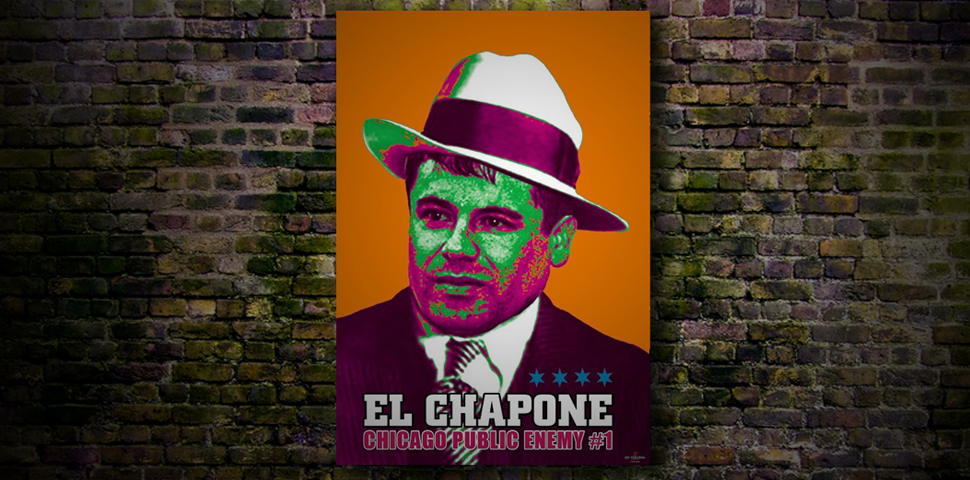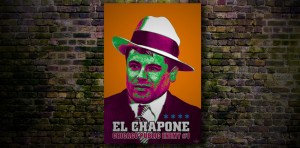Where would country music be without Jesse James? Without Scarface, the Godfather or Frank White who would Biggie have rapped about? What drove Eminem, Jay-Z and Beyonce and even Tupac to all cut tracks entitled “Bonny & Clyde’? There has always been a sub-culture of music that praises the villain, the gangster and the crook, real or imagined, turning brutal crimes into vigilante fantasies and law breakers into heroes. But what happens when it all comes down, when the inspiration for lawless lyrics and badass ballads finally gets hauled off in chains? Does it break the music or open the door for a new type of act to take over? Now that the notorious Joaquin “El Chapo” Guzman of the brutal Mexican Sinaola Cartel has been arrested we’re about to find out. Old school narcocorrido music, known derisively as Mexico’s “gangster rap”, has lost it’s muse, which blows the doors open for a cultural and musical revolution in Mexico, and the insurgent genre just might be Hip-Hop.
Joaquin “El Chapo” Guzman was arrested by Mexican and American law enforcement last week after being one of the Western Hemisphere’s most wanted drug kingpins over the last 10 years. “El Chapo” along with his 1st lieutenant Ismael “El Mayo” Zambada Garcia ran the brutal Sinaola Cartel, named for the Mexican state where it began in 1989. The Sinaola cartel is one of five major Mexican cartels, along with the Zetas, Juarez, Tijuana and Gulf cartels that that have been the target of a bloody crackdown by the Mexican government that has cost over 60,000 lives since 2006. Despite this, Guzman himself has become one of the richest men in the world, breaking the top 75 on the Forbes list since 2009 with a net worth of over 1 billion. While the Sinaola Cartel has brought untold misery to thousands across Mexico and the Southwestern United States, El Chapo himself has become almost a cult hero to some like John Gotti or Tony Montana. And nowhere is this more evident than in the narcocorrido music genre in Mexico.
“We take care of El Mayo
“Here no one betrays him…
“We stay tough with AK-47s and bazookas at the neck
“Chopping heads off as they come
“We’re bloody-thirsty crazy men
“Who like to kill.”
El Komander (The Commander)
Alfredo Rios known by his popular stage name “El Komander” is one of the hottest narcocorrido acts in Mexico. In his lyrics he plays the role of a soldier in the Sinaola army protecting El Chapo’s captain “El Mayo”. But El Komander isn’t the only narcocorrido act with gangster fantasies; Los Tucanes de Tijuana, The Merry Del Barranco, a local Sinaola singer who calls himself “El Chapo” and even American rapper Gucci Mane have all praised Guzman in their songs. According to Joshua Kun a professor of Ethnic Studies at USC who analyses Mexican American border culture this is not new “Narcocorridos have always talked about smuggling, first it was tequila, then it was weed, then heroin, always illicit economies,” he says. But in a bloody drug war where cartel bosses publicly execute police officers the music has taken a darker turn. While many Mexican artists claim loyalty to a particular local cartel, El Chapo seems to have taken a preeminent spot in the genre, earning praise in lyrics even as his actions and the Sinaoloa cartel drag Mexico into a pit of kidnappings, rapes and assassinations. In the wake of a bloody cartel vs. government war that has literally made parts of Mexico lawless, narcocorridos, especially those praising El Chapo are often referred to as Mexico’s own version of “Gangster Rap”.
As Chapo’s popularity and that of narcocorridos have grown the Mexican government has tried to ban the music from certain stations or even investigate singers who appear to be too close to cartel bosses. Either through fear or sheer incompetence Mexican government officials have never been able to establish a concrete connection between criminal acts and musical acts, but that doesn’t mean it isn’t there.
“I don’t know of a (record) label for the Sinaloa cartel as a described business platform. But when you have an artist selling Sinaloa T-shirts and hats at a concert,” says Dr. Kun “…and pledge allegiance to the cartel that raises some red flags”.
In America, the War on Drugs and the crack epidemic in the mid to late 1980’s brought about some of the most conscious rap and Hip-Hop songs ever to come out of a microphone. MCs grappled with neighborhoods decimated by crack babies, and a Reagan era drug policy that put millions of mostly poor men of color into the legal system. Grandmaster Flash and Melle Mel’s “White Lines (Don’t Don’t Do it)”; Public Enemy’s “Night of the Living Baseheads”; Brand Nubian’s “Slow Down” and even Run DMC’s “Pause” all told the tales of crack and drugs destroying lives and communities. And it seems like a similar phenomenon is occurring in the Mexican music scene. While the narcocorrido artists sell millions of songs about the exploits of men like El Chapo, an insurgent Hip-Hop movement in Mexico seems to be taking a different route.
“Hip-Hop is really new in Mexico” says Carlos Davalos, who has hosted Mexico’s first and longest running Hip-Hop radio show “Scratch A Mama” on 90.9 F.M. in Mexico city. “Hip-Hop and rap in Mexico today is like it was in America in 86’ – it’s that young” he says. He sites that the first member of the Wu Tang Clan to ever visit the capitol Mexico City for a concert was Method Man in December of 2012. Considering Wu Tang has been around for over 20 years doing concerts all over the world Mexico is very late to the Hip-Hop game. Yet, the music in its infant form arose out a desire by young artists to fight back against the old narcocorrido big band structure and the drama and violence that came with it. “We’re not doing narcocorridos,” says Dr. Kun citing local artists in Mexico. “We wanna be P.E. (Public Enemy) we wanna be Cyprus Hill”. If narcocorrido music is defined by loyalty to cartels and violence the burgeoning Hip-Hop scene in Mexico is defined by consciousness raising artists bringing the other side of the story to their lyrics. Artists like Akil Ammar who raps almost exclusively about politics, or Mujeres Trabajando (“Women who Work”) who rap about women’s lives and rights of the poor in Mexico. More recently, rappers like MC Enfermo as well as groups like Quid Comba have popped up to rap about the violence of the cartels in Mexico, sometimes leaving concerts halfway through sets to avoid an ambush but still fighting to change the music scene across the nation.
The arrest of El Chapo may not bring down the multi-billion dollar drug cartels that plague Mexico but his legend as an inspiration for hit songs will definitely take a hit. As Guzman is stripped of his lavish lifestyle, publicly tried and forced to recount his numerous brutal crimes the sexy veneer that has made him the subject of hundreds of ballads will likely begin to fade. The Mexican people appear to be expecting more from their government and perhaps soon their music too. Narcocorridos popularity won’t fade overnight just like El Chapo’s power won’t disappear after his first interrogation, but the Mexican music consumer seems to want something new, and perhaps Hip-Hop with an ear to the streets instead of an eye for the cartels, might be the change they’re looking for.
@DrJasonJohnson

